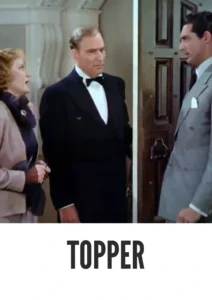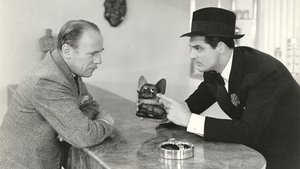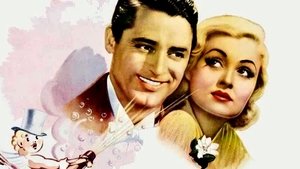Video Sources 0 Views
- Watch trailer
- Topper 1937 Colorized


Synopsis
Table of Contents
ToggleGhosts, Glamour, and Giggles: Topper (1937) in Stunning Color

Step back in time with Topper, a delightful screwball comedy from 1937, now beautifully colorized for a modern viewing experience. Starring Cary Grant and Constance Bennett, this ghostly romp follows the spectral adventures of a fun-loving couple and the uptight banker they befriend. Also known as Topper Takes a Trip and Topper Returns, this is perfect for fans of classic comedies and those looking for a lighthearted escape, this HD download brings a touch of Hollywood’s Golden Age to your screen.
Topper Storyline: A Spirited Adventure
Topper tells the story of George and Marion Kerby, a wealthy and mischievous couple who die in a car accident and return as ghosts. Bored with the afterlife, they decide to liven things up by meddling in the life of Cosmo Topper, a strait-laced banker.As George and Marion try to teach Topper how to enjoy life, they lead him on a series of outrageous adventures, including reckless driving, public disturbances, and romantic escapades. Chaos ensues as Topper struggles to maintain his reputation while under the influence of his ghostly companions. The film culminates in a hilarious courtroom scene where Topper must defend himself against a series of absurd charges. Ultimately, Topper is a charming and whimsical comedy that celebrates the joys of spontaneity and living in the moment.
Movie Cast
The film features a stellar cast of actors who bring this supernatural comedy to life:
- Cary Grant as George Kerby
- Constance Bennett as Marion Kerby
- Roland Young as Cosmo Topper
- Billie Burke as Mrs. Topper
- Alan Mowbray as Eddie
Movie Genre
Topper falls into the genre of screwball comedy, with elements of fantasy and romance that are characteristic of Hollywood’s Golden Age. Its lighthearted tone and whimsical plot make it a beloved classic that continues to entertain audiences of all ages.
Historical Context: Hollywood’s Golden Age
Released in 1937, Topper represents a high point in the screwball comedy genre, showcasing the wit, sophistication, and glamour of Hollywood in the 1930s. The film was produced during a period of economic recovery and growing optimism in the United States, which is reflected in its escapist themes and lighthearted tone. Topper was a major box office success and helped to solidify Cary Grant’s status as a leading man. Its enduring popularity is a testament to its timeless appeal and its ability to capture the spirit of a bygone era.
Colorization Details
This colorized version of Topper has been meticulously restored using modern digital techniques, enhancing the visual appeal while preserving the film’s original charm and wit. The colorization process involved carefully analyzing the grayscale tones of the original black and white footage and assigning appropriate colors to each scene. While the specific software used remains proprietary, the techniques employed included advanced algorithms for color palette selection and image enhancement. This painstaking process brings new life to the characters and settings, making the story even more engaging for modern audiences. While some may debate the merits of colorizing classic films, it introduces these films to a broader audience, ensuring their legacy for future generations.
Technical Details
- Director: Norman Z. McLeod
- Screenplay: Jack Jevne, Eddie Moran, and Harry Tugend
- Based on: the novel by Thorne Smith
- Cinematography: Norbert Brodine
- Edited by: Gene Milford
- Production Company: Hal Roach Studios
- Distributed by: Metro-Goldwyn-Mayer
- Runtime: 97 minutes
Technical Specifications
- Download Format: MP4
- Resolution: HD (1080p)
- Compatibility: Compatible with most devices, including smartphones, tablets, computers, and smart TVs.
Reviews and Critical Reception
Topper (1937) is widely regarded as a classic of the screwball comedy genre, praised for its witty dialogue, charming performances, and inventive special effects. Its blend of humor, romance, and fantasy has made it a beloved film for generations of moviegoers. As a timeless and entertaining comedy, Topper offers a delightful escape from the everyday and a celebration of the joys of life.
FAQs
- Q: What is Topper about?
- A: Topper is a screwball comedy about a strait-laced banker who is haunted by a fun-loving couple of ghosts.
- Q: Is Topper (1937) a well-known classic film?
- A: Topper is a beloved classic of the screwball comedy genre, known for its wit, charm, and inventive special effects.
- Q: Is this version of Topper colorized?
- A: Yes, this version has been professionally colorized to enhance the viewing experience.
- Q: What makes Topper so entertaining?
- A: Topper‘s blend of humor, romance, and fantasy, combined with its witty dialogue and charming performances, makes it a timeless and entertaining film.
- Q: What is the download format?
- A: The download format is MP4, which is compatible with most devices.
- Q: What resolution is the download?
- A: The resolution is HD (1080p), providing a high-quality viewing experience.
Download Now in HD!
Watch Topper Today!













